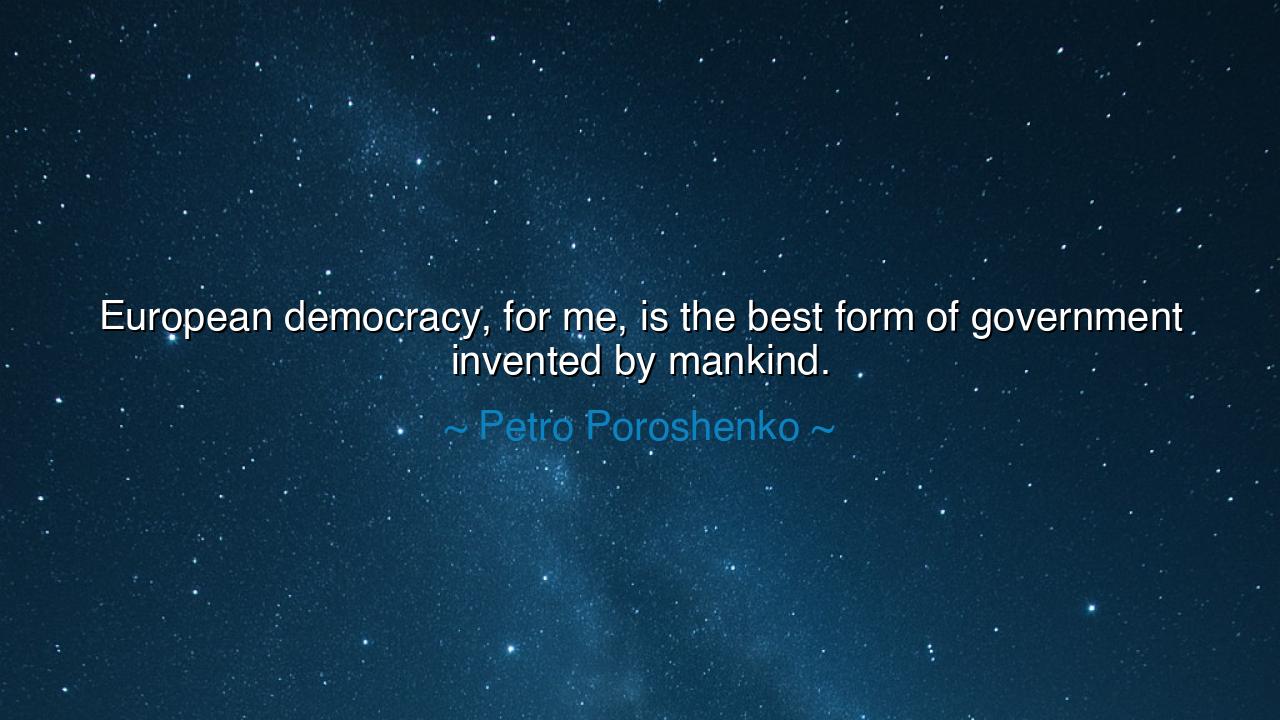
European democracy, for me, is the best form of government






Hear, O sons and daughters of liberty, and ponder the words of Petro Poroshenko, who declared: “European democracy, for me, is the best form of government invented by mankind.” These are not the idle praises of a politician, but the conviction of a man who has seen his homeland bleed for freedom. In this brief yet mighty statement, Poroshenko, former President of Ukraine, speaks to the enduring power of democracy—not merely as a system of governance, but as a moral covenant between the rulers and the ruled. It is a testament to faith in human dignity, in accountability, and in the right of every person to shape the destiny of their nation.
The origin of these words can be traced to Poroshenko’s years of leadership amid the storm of conflict and transformation in Ukraine. He rose to power after the Euromaidan Revolution of 2014—a movement where thousands of Ukrainians took to the streets, demanding justice, transparency, and closer ties to Europe. For them, “European democracy” symbolized not geography, but values: rule of law over tyranny, truth over corruption, freedom over fear. Poroshenko’s declaration thus reflects not only admiration for Europe’s political system but reverence for the ideals that gave birth to it—the belief that legitimate power springs from the consent of the governed, and that justice must serve all, not the few.
When he speaks of “the best form of government invented by mankind,” he does not mean that democracy is perfect. Rather, he acknowledges that it is the most human of all systems, for it trusts in the people’s capacity for reason, virtue, and self-correction. Democracy is fragile, yet resilient—it allows dissent without destruction, criticism without chaos, and renewal without revolution. It is not the government of angels, but of men striving toward light, ever conscious of their flaws yet unwilling to surrender to despair.
History itself has tested this truth. Consider the long and turbulent journey of Europe itself—from monarchies and empires to modern republics. The blood of centuries—wars of religion, revolutions, and resistances—watered the roots of democratic institutions. The Magna Carta, the French Revolution, the fall of the Berlin Wall—all were milestones in humanity’s pilgrimage toward freedom. Each moment, born from struggle, revealed that democracy is not inherited; it is earned and maintained through vigilance and sacrifice. Poroshenko, standing on this long continuum of struggle, recognized that Ukraine’s destiny lay not in imitation, but in the realization of these universal ideals within its own soil.
Yet Poroshenko’s words also carry a note of warning and responsibility. For democracy, though “the best form of government,” is also the most demanding. It asks not for blind loyalty but for constant participation. It requires citizens who are informed, courageous, and compassionate. When people grow apathetic, or when they trade freedom for comfort, democracy begins to decay—not by overthrow, but by neglect. In this sense, Poroshenko’s statement is both a celebration and a challenge: a call to defend democracy not as spectators, but as builders of its daily work.
The story of post-Soviet Eastern Europe offers both caution and hope. Where tyranny once silenced nations, democracy now gives them voice. But its survival depends upon character—the ability of a people to resist the old seductions of power, corruption, and fear. Poroshenko’s Ukraine has stood as a crucible of this truth. Through war, propaganda, and economic hardship, its people have shown that democracy is not defined by prosperity, but by the courage to choose liberty even in suffering.
The lesson, therefore, is clear and timeless: democracy is not merely a system to be admired—it is a discipline to be practiced. Cherish it not as an inheritance, but as a sacred duty. Uphold its laws, yet guard its spirit; criticize its flaws, yet never cease to believe in its promise. For while autocracy demands only obedience, democracy demands virtue—and through that virtue, it grants the highest gift of all: the dignity of self-governance.
Thus, Poroshenko’s words resound through the ages as both affirmation and appeal. Let every nation remember: the beauty of European democracy lies not in its institutions alone, but in the hearts of those who keep them alive. When freedom is cherished, when justice is pursued, and when the people stand watch over their own power, then indeed—this is the best form of government mankind has yet conceived.






AAdministratorAdministrator
Welcome, honored guests. Please leave a comment, we will respond soon